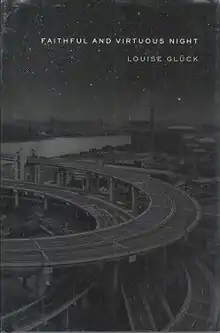Faithful and Virtuous Night
Faithful and Virtuous Night is a poetry collection by Louise Glück, published in 2014.
 First edition | |
| Author | Louise Glück |
|---|---|
| Genre | Poetry |
| Publisher | Farrar, Straus and Giroux |
Publication date | 2014 |
Composition and contents
The collection alternates between traditional poems and paragraph-long prose poems,[1] marking the first inclusion of prose poems in a book by Glück.[2]
Kathryn Davis, a friend of Glück's, read the collection's poems as they were written.[3] She suggested Glück compose and include its prose poems. Glück drew inspiration from the short works of Franz Kafka while writing the collection.
Reception
In Boston Review, Craig Morgan Teicher wrote that the collection "[...] may be Glück’s strangest work yet, the hardest to describe or put in line with the others."[4] Writing for NPR, Annalisa Quinn both praise and criticized the collection's abstruseness, referring to the prose poems as "blandly koanic" while also writing that some of the "[...] poems' incompleteness and inscrutability are suggestive rather than prohibitive."[5]
Honors and awards
Glück received the National Book Award for Poetry for the collection.[6] It was also shortlisted for the T. S. Eliot Prize.[7]
References
- Rumens, Carol (25 August 2014). "Poem of the week: A Work of Fiction by Louise Glück". The Guardian. The Guardian. Retrieved 10 October 2020.
- Gonzalez, Elisa (Spring 2015). "An Interview with Louise Glück". Washington Square Review. Retrieved 10 October 2020.
- Giraldi, William (20 November 2014). "Internal Tapestries: A Q&A With Louise Glück". Poet's & Writers. Retrieved 10 October 2020.
- Death Mask (8 January 2015). "Death Mask". Boston Review. Boston Review. Retrieved 10 October 2020.
- Quinn, Annalisa (11 September 2014). "The Ecstatic Blankness Of Poet Louise Glück". NPR.org. NPR. Retrieved 10 October 2020.
- "'Redeployment,' 'Age Of Ambition' Win National Book Awards". NPR.org. NPR. 19 November 2014. Retrieved 10 October 2020.
- Flood, Alison (23 October 2014). "TS Eliot prize shortlist joins conflict and reconciliation in the Middle East". The Guardian. The Guardian. Retrieved 10 October 2020.